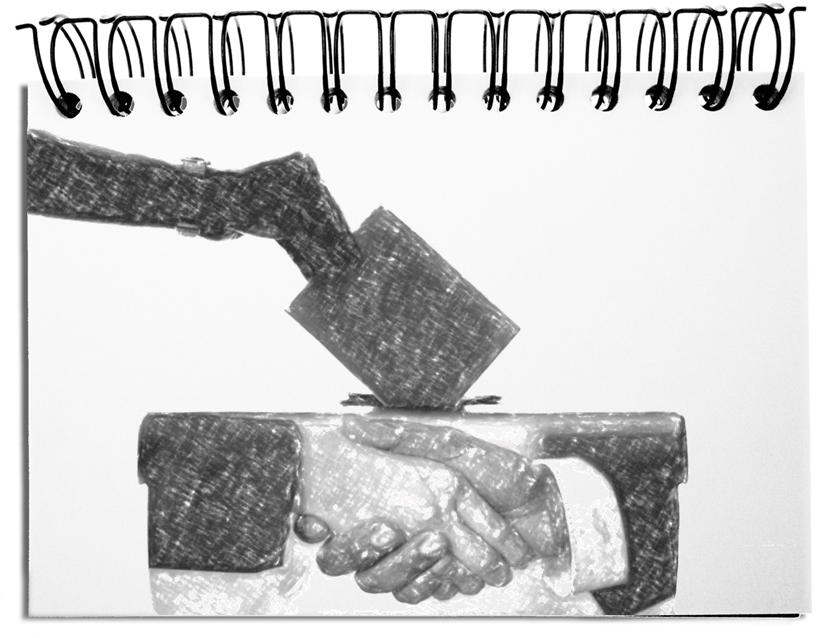Every day we choose our preferred alternatives out of the flood of possibilities. It starts when we wake up and decide to jump out of bed or stay in bed for another five minutes. In the day, we choose from many private and commercial offers, the ones we prefer. As long as we can afford them, we have no problem. Now let’s imagine that we buy a new jacket. When paying we find out that we get a completely different one. Upon inquiry, the person behind the register explains that the colleagues have agreed to give us a different one. What’s going on here?
An election should always be free of influences, observations, and inequality. If this is not the case, this act becomes a farce. The same applies to democratic elections. At least two alternatives are required for a ballot. That way is how people and parties are selected to represent the electorate in certain offices. The fragmented opinions leads in Germany to an increasing number of parties. It results in a majority not being capable of governing – unlike in the USA, where are only two parties choose. Consequently, coalitions capable of reigning are formed AFTER the election – regardless of the voters’ verdict.
- Coalitions as late as AFTER the election
Parties are elected. They promise their election program beforehand, which would be fulfilled at best if they would get the majority. The major parties in Germany only have enough for 20 to 30%. To offer the voter the alternatives for the election, the coalitions with their compromises would also have to stand for election. Only then would voters be sure that they would be involved in the politics of the following four years. - The final agreements
Since the coalition agreement is negotiated afterward, voters cast their ballots for a grab bag. It is true that the partners in a coalition bring their programs to the negotiations and draw up a contract that lasts for the duration of the legislature. However, shortened compromises are agreed. They release the elected people from the promises made before the election. The electorate can act on them not until four years later unless they get again blinded by new promises. Additional agreements are negotiated tit-for-tat during the legislative session. After the election, the electorate no longer influences the parties. For the duration, they become independent in the style of classical sovereigns. - Big coalition – minor opposition
The more percentages a coalition gathers behind itself, the more freedom it has. As soon as it brings more than three-quarters of the votes together, the result is that debates no longer take place in parliament but only within the government. In the big coalition, the alliance of the two largest parties was already sufficient to undermine parliament. This parallel society has the power because the parliamentary regulations no longer work. Parliament is not anymore part of the struggle for solutions. - Line whip replaces responsibility to the electorate
Despite the principle of the free mandate that binds members of parliament only to their conscience, the members of a party follow the guidelines of their executive committee. Although voters select their representatives according to their attitudes, these qualities are lost in parliament. The line whip demands from the deputies to subordinate themselves to the party policy of the executive committee.
Bottom line: Politicians like to draw our attention to the “threatening” influences of the internet, the “fringe” parties, and the apparent problems in society – such as economic development, wind turbines, immigration, compulsory vaccinations, and masks. That way, they distract from the real issues with democracy. The electorate no longer has control over their parliaments. The parliamentarians pursue their agendas:
1) to get elected; 2) to implement party policies; 3) to serve their stakeholders.
An election thus becomes a grab bag. Only after the votes are counted, the governing coalitions are negotiated behind closed doors without the electorate. The electorate lacks the alternatives because the coalition programs have not even been negotiated before the election. In addition, the binding agreements become the maximum program for the government – no more. With a majority, the coalition can govern without considering the needs of the entire parliament. Decisions are negotiated within the coalition. In addition, the hidden factional coercion leads to the release of any responsibility of the delegates. Power is assumed by party executives and their representatives in negotiated ministries. The people’s representatives have thus found ways to govern, regardless of the will of the voters. With today’s sizes of parties, an election in Germany becomes a grab bag, the contents of which only become visible after the election is over and coalitions have been found and negotiated.

